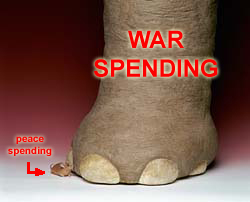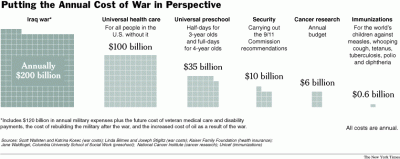Speaking of dumb things we waste money on, the world spent 228 times as much on its militaries in 2006 as it did on U.N. peacekeeping operations, according to the latest Vital Signs Update from the Worldwatch Institute. United Nations peacekeeping operations around the world between July 2007 and June 2008 are expected to run to $7 billion-substantially higher than the record $5.6 billion spent in 2006-07. Yet world military budgets stood at a staggering $1,232 billion in 2006.

“The continuing imbalance between peacekeeping and military spending is deeply troubling,” says Michael Renner, author of the Update. “Even though we see peacekeeping budgets at new heights, they are still highly inadequate in the face of present challenges.”
Two new U.N. missions were authorized during 2007: UNAMID, a U.N.-African Union “hybrid” force in the Darfur region of Sudan, and MINURCAT, a mission in the Central African Republic (CAR) and Chad. This area of Africa is home to a series of partially linked crises, with instability and violence in Darfur spilling over into neighboring Chad (where government and two rebel groups are clashing along the border). And in the CAR, fighting persists in the northwest and along the border with Chad and Cameroon.
Two-thirds of all Blue Helmets, as U.N. peacekeepers are called, are currently deployed in nine missions in Africa. The Middle East has the second most, with 16 percent, followed by the Americas (11 percent), Europe (6 percent), and Asia (3 percent).
As of November 2007, $3.15 billion in mandatory U.N. peacekeeping dues had not been paid by national governments. The United States alone owed $1.1 billion, or 34 percent of this total. In contrast to the relatively low price of paying its peacekeeping debts, the United States has spent about $632 billion on the war in Iraq, an average of more than $100 billion per year.
“These arrears keep peacekeeping efforts in a constant state of crisis, risking stability in several critical regions of the world,” says
Renner.
I of cource would rather spend some of that extra money on renewable energy, but jebus, do we really need to spend so much money on war? Can’t we like pick some remote island someplace and settle all of our disputes with rock paper scissors? War is such an abject waste of time and energy, and the really scary thing is that we are going to spin our wheels on war while we are killed by global warming, which in my opinion is far worse than terrorism. I am not the only one
Mayor Bloomberg [Monday] compared the scourge of global warming to the threat of terrorism and the proliferation of weapons of mass destruction. Although it is a “long-term” fight, he said, reducing gas emissions may save the life of “everybody” on the planet, the same way that fighting terrorism and its proliferation saves lives in shorter terms.
Addressing a U.N. climate change conference, the mayor also announced a new plan to reduce the use of tropical hardwoods by New York City and told delegates that the city plans to host a meeting in June of leaders from 20 major world cities to discuss ways for the largest municipalities to reduce global warming. Other participants in the conference called for a “war” against climate change, in which the United Nations would serve as a front-line combatant.
Mr. Bloomberg renewed his call, made first late last year, for taxing countries such as America that emit large amounts of carbons, which are believed to cause changes in the planet’s climate. “So long as there’s no penalty or cost involved in producing greenhouse gases, there will be no incentive” to meet targets set by international institutions, the mayor told the General Assembly. “For that reason, I believe the U.S. should enact a tax on carbon emissions.
“Terrorists kill people. Weapons of mass destruction have the potential to kill an enormous amount of people,” Mr. Bloomberg told reporters after addressing the U.N. General Assembly, but “global warming in the long term has the potential to kill everybody.”
I imagine a world in the not to distant future when this line of reasoning is taken to its logical end. If things don’t change rapidly in the next few years we will as a species be facing a world ravished by global warming a lot of angry people are going to look towards America and ask “why didn’t you do something, you are so rich, and we are so poor, and you refused to lift a finger.”
You think people were pissed off at us before, just wait. Fighting global warming is a two-fer. Not only do we stop the horrible consequences of a climate gone mad, but we also quell future anger towards our nation all for a price much less than fighting these repulsive illegal wars.
